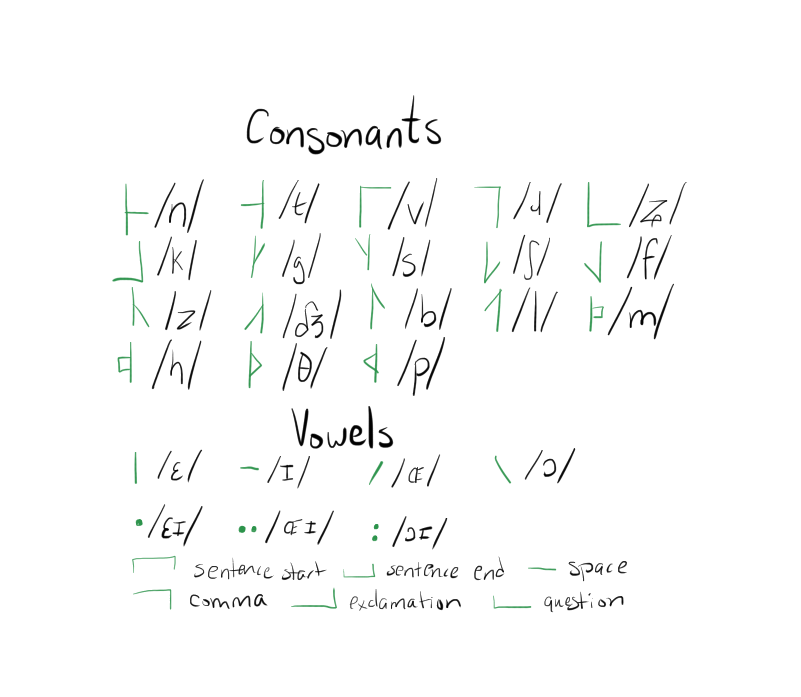Kreshnei
Written by and bufiogarugi
Header image by Vertixico
Kreshnei is the language spoken almost exclusively by Kreshmen. They also speak the trading language, so the main place you could ever hear Kreshnei being spoken is in Kreshniva.
Kreshnei's written form is an abjad language, meaning that only the consonants are represented by individual symbols. The vowels are instead represented by markings attached to the consonant symbols.
Header image by Vertixico
Kreshnei is the language spoken almost exclusively by Kreshmen. They also speak the trading language, so the main place you could ever hear Kreshnei being spoken is in Kreshniva.
Kreshnei's written form is an abjad language, meaning that only the consonants are represented by individual symbols. The vowels are instead represented by markings attached to the consonant symbols.
Writing System
The alphabet is comprised of simplistic symbols, which are entirely made up of lines and angles. This is due to the fact that Kreshniva is entirely within frozen tundra, and due to the frequent snowing and frozen rain. Before the paper-making process was discovered, everything was written down on stone, as any other surface would not hold the message for very long. Even though Kreshniva does use paper records, these symbols largely retain their rigid shapes due to tradition.
Geographical Distribution
Mainly spoken in Kreshniva, may be spoken by Kreshmen in other regions (though it's more likely that they'll use the trading language).
Phonology
Kreshnei has 18 consonants and 4 vowels.
Consonants
b, dʒ, f, g, h, k, l, m, n, p, s, t, v, z, ɹ, ʃ, ʑ, θ
Vowels
ɔ, ɛ, ɪ, ɶ
Consonants are their own symbols. Vowels are smaller, attached to the consonant symbols.
In the case of a word having two vowels between two consonants, the first vowel will attach to the first consonant, and the second vowel will attach to the second consonant.
One consonant can, at maximum, have two vowels attached to it. One vowel on the front, one vowel on the back.
Consonants are their own symbols. Vowels are smaller, attached to the consonant symbols.
In the case of a word having two vowels between two consonants, the first vowel will attach to the first consonant, and the second vowel will attach to the second consonant.
One consonant can, at maximum, have two vowels attached to it. One vowel on the front, one vowel on the back.
Morphology
Noun Classes
Kreshnei splits up nouns into two different types: Living, and Object. Plants, animals, and the like are grouped into Living, while anything that isn't alive is grouped into Object.Syntax
Kreshnei is written from top to bottom, right to left. The word order is Subject-Oblique-Object-Verb. For instance
Finally, this is what "I handed him the book" becomes in Kreshnei:
"I handed him the book."becomes:
"I the book him handed."
Articles
Kreshnei doesn't use any articles. This would in turn make the above sentence into:"I book him handed."
Pronouns
It's common practice for pronouns to be dropped if the noun referred to by the pronoun is doing something. In the case of the above sentence, the "I" is dropped and instead implied by the conjugation of "handed", while "him" remains because they aren't actively doing something. This turns the sentence into:"Book him handed."with an implied "I".
Finally, this is what "I handed him the book" becomes in Kreshnei:
"Bifi ve remirohoza."(/bɪfɪ vɛ ɹɛmɪɹɔhɔzɶ/)
Vocabulary
Explanations
[1]Kreshmen tend to pride themselves on being purely Kreshmen. As such, they see insinuations of impurity as highly offensive. This is also used as either a slur against non-Kreshmen or a word to refer to them. The two main ways to figure out which meaning the speaker is using are context and tone of voice.[2]This is a slur used to refer to Actreines who have some Kreshman heritage and some non-Kreshman heritage. Unlike with mizkrezh, this is only ever used as a slur. If the speaker is just referring to someone whose heritage is not purely Kreshman, they will likely just call them bolole (bɔlɔlɛ), which translates as "halflings".
[3]Unlike with mizkrezh, this word is more often used to just refer to non-Kreshmen, though some do use this word as a slur. Those who do use it as a slur see it as a less-harsh slur than mizkrezh, as it quite literally means "outsider".
[4]Kreshmen place a large amount of importance on the money they make, as a protectorate made up of primarily traders and merchants. As such, to call another person "thief" is a high accusation. Typically this is reserved for theft of things relating to their trades, such as money, products, or crops. However, it is not uncommon to hear someone called a pigi if they have stolen something else from them.
isho saitomal pepoiremais, babo mizh sejil biherais
(ɪʃɔ sɶɪtɔmɶl pɛpɔɪɹɛmɶɪs, bɶbɔ mɪʑ sɛʤɪl bɪhɛɹɶɪs)
The Krezhman axiom, written in Krezhnei
Roughly translates to "Ice tempers the great, and shatters the unworthy"
(ɪʃɔ sɶɪtɔmɶl pɛpɔɪɹɛmɶɪs, bɶbɔ mɪʑ sɛʤɪl bɪhɛɹɶɪs)
The Krezhman axiom, written in Krezhnei
Roughly translates to "Ice tempers the great, and shatters the unworthy"
Spoken by
Common Phrases
General Phrases and Words
maik (mɶɪk)
Hello
seig (sɛɪg)
Goodbye
pej goil pek ko (pɛʤ gɔɪl pɛk kɔ)
My name is
Insults and Profanities
mizkrezh (mɪzkɹɛʑ)
The closest translation is "non-Kreshman"[1]
bolohipo (bɔlɔhɪpɔ)
halfbreed[2]
lethizoi (lɛθɪzɔɪ)
outsider[3]
pigi (pɪgɪ)
thief[4]
Common Female Names
Sarapheus
Common Male Names
Jakub







Comments
Author's Notes
Header image courtesy of Vertixico